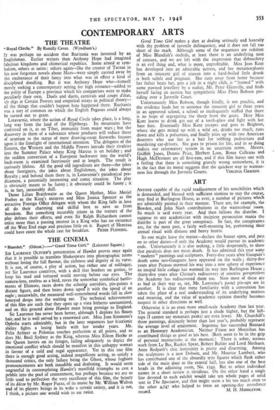CONTEMPORARY ARTS
THE THEATRE Ir was perhaps no accident that Ruritania was invented by an Englishman. Earlier writers than Anthony Hope had imagined fabulous kingdoms and chimerical republics. Some aimed at sym- bolism, others at satire: others again—like the creator of Tarzan in his now forgotten novels about Mars—were simply carried away by the exuberance of their fancy into what was in effect a kind of
disciplined doodling. But it was Anthony Hope who—himself merely _seeking a contemporary setting for high romance—added to the polity of Europe a province which his compatriots were to make peculiarly their own. Duels and duets, carnivals and coups d'etat, sly digs at Certain Powers and empirical essays in political theory— all the things that couldn't happen here happened there. Ruritania
was a sort of common on which the English Pegasus could always be turned out to graze. Lotavarnie, where the action of Royal Circle takes place, is a long, long way from the land of the Elphbergs. Its mountains have conferred on it, as on Tibet, immunity from major wars ; but the discovery in them of a substance whose products will reduce those of uranium to the status of mere drawing-room fireworks focuses upon it the limelight of international attention. The delegates of the Eastern, the Western and the Middle Powers intrude their rivalries into the Summer Palace where King Marcus is on holiday ; and the sudden conversion of a European backwater into the world's back-room is examined facetiously and at length. The result is curiously lifeless. All the good old ingredients are there—the jokes- about foreigners, the jokes about Englishmen, the jokes about Royalty ; and behind them there is, in Lotavarnie's paradoxical pre- dicament, a potentially interesting and comic situation. The play is obviously meant to be funny ; it obviously could be funny ; it is, in fact, inexorably dull.
Dame T .ilian Braithwaite as the Queen Mother, Miss Meriel Forbes as the King's mistress and Miss Jessica Spencer as the attractive Foreign Office delegate with whom the King falls in love all do their charming and skilful best to save us from boredom. But something incurably jejune in the texture of the play defeats their efforts, and even Sir Ralph Richardson cannot enlist more than a passing interest in a King who has no existence off the West End stage and precious little on it. Rupert of Hentzau could have eaten the whole cast for breakfast. PETER FLEMING.


































 Previous page
Previous page